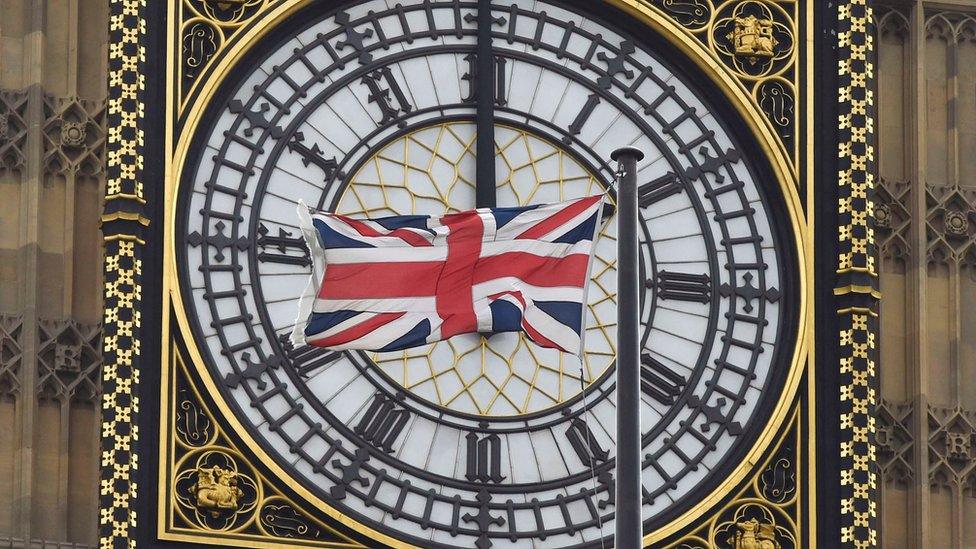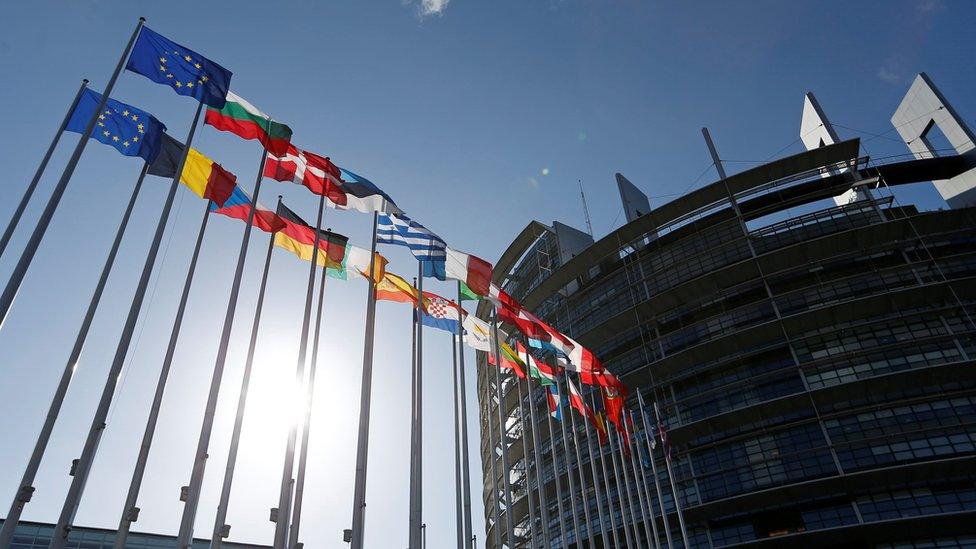Reality Check: How would the UK rid itself of EU law?
- Published

UK law has evolved for over 40 years under the influence of and in combination with EU law.
EU law now courses through the veins of many areas of UK law on immigration, asylum, discrimination, employment, agriculture, public procurement, competition and regulation - to name but a few.
The idea that its influence could be easily or instantly expunged, and that there would be a return to a rosy hued common law past, where all British law is created by the British parliament and British judges, is fanciful.
It is not surprising that following the publication of a recent report on a Brexit, Lord Boswell, the chair of the House of Lords EU Committee, said extricating ourselves from the EU would "involve untangling a Gordian knot of EU laws".
He added: "You can't just cut through them - practically every one of the thousands of EU laws that apply in the UK would need to be reviewed, and then assessed on its merits, before the government would decide whether or not to leave it on the statute book."
Any review and removal of EU law within UK law would be on a scale quite unlike anything we have ever seen before. It would have to avoid some dangerous elephant traps.
It would need to ensure no legal vacuums opened up, that public bodies could continue to make effective decisions and that relationships between individuals and other commercial bodies remained on a sound legal footing.
In other words, that the rule of law continued to function effectively during the process of review, removal and replacement.
To remove EU provisions enacted by acts of Parliament, the acts themselves would have to be amended or repealed. Until that happened, the UK courts would have to decide to what extent they continued to take into account relevant EU case law when interpreting UK law that embodies or is influenced by EU law.
Similarly, EU provisions which are implemented in the UK by statutory instrument (these flesh out the detail of acts of Parliament) will need to be reviewed, to decide if they need to be amended or repealed.
It will also be necessary to ensure that they still have a proper legal basis within the UK and that their legal content can be adequately identified, for example where they make reference to provisions of EU law or even simply incorporate EU measures by cross-reference.

So if, for example, we decide that in order to sell our cars to Germany we need to continue to meet EU standards on emissions, we would need to retain the existing standard and put it into our domestic law.
Perhaps the most difficult category for review consists of EU provisions - especially EU regulations - which have direct effect in UK law.
In each such case, we would need to decide not only whether the EU standards are to be kept, amended or abolished, or whether they are to be retained.
So, if we decide that we want to keep some of the existing consumer protection rights laid down in EU regulations, we would need to implement those rights into domestic legislation, otherwise they would disappear from the legal system on our withdrawal from the EU.
Immense and complex though task of review and change would undoubtedly be, it is clearly very far from being a purely technical exercise. It would involve a mind-boggling number of crucial policy decisions about how we want to regulate basic aspects of the nation's economic and social life into the future.
Which EU standards would we want to keep, more or less as they exist already and which would we want to change or abolish altogether - and in such cases, exactly with what new rules would we replace them?
Such questions would affect almost every aspect of national life - not just the immigration regime or trading rules for manufactured goods or employment rights for workers, but also entire fields such as environmental law, consumer protection and financial services regulation.
'Extensive delegation'
In some sectors - such as agriculture and fisheries - the impact of withdrawal could be so dramatic that the UK would effectively be faced with the task of designing an entirely new regulatory framework from scratch.
And according to Michael Dougan, Professor of European Law at Liverpool University, there are likely to be profound constitutional changes as a result of a review that would be so enormous as to require a lifetime's worth of Parliamentary legislative sessions to complete.
"It is difficult to envisage how the job could possibly be done other than through an extensive delegation of regulatory power from Parliament to the government. That could mean a massive empowerment of the executive - in effect, allowing the government to rewrite the legislation governing many aspects of economic and social life with only minimal input from or supervision by Parliament itself," he says.
It is clear that the consequences of a "bonfire of EU laws" are many and varied.
For those who want a Brexit, the idea of a celebratory bonfire of EU laws is an attractive prospect, but just how easy would it be and what laws would be thrown on the pile?



- Published8 June 2016

- Published12 April 2016

- Published22 February 2016
